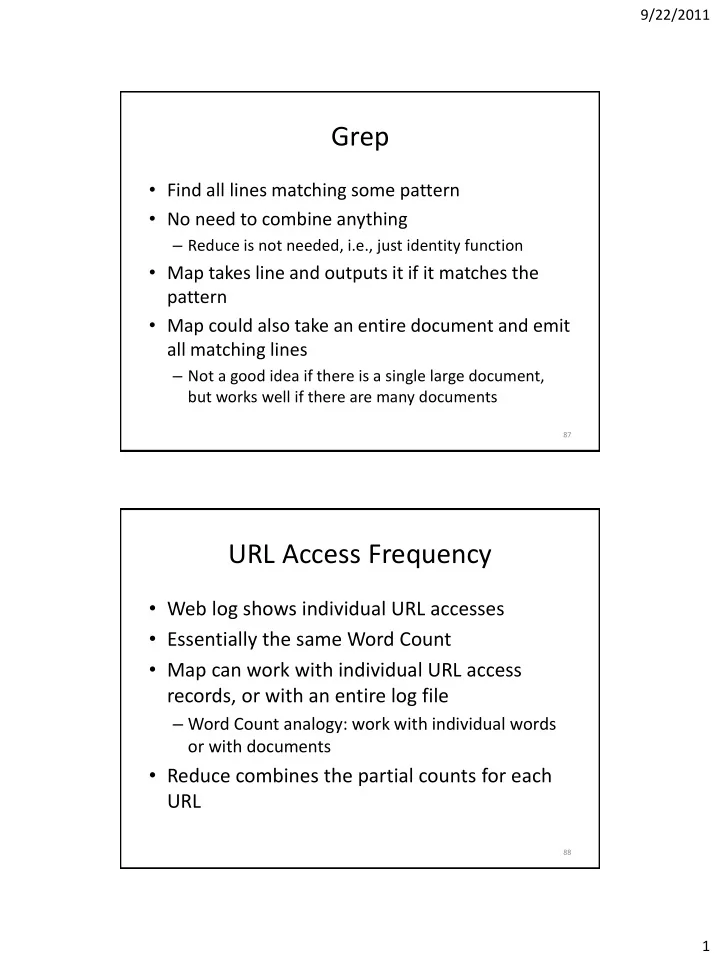

9/22/2011 Grep • Find all lines matching some pattern • No need to combine anything – Reduce is not needed, i.e., just identity function • Map takes line and outputs it if it matches the pattern • Map could also take an entire document and emit all matching lines – Not a good idea if there is a single large document, but works well if there are many documents 87 URL Access Frequency • Web log shows individual URL accesses • Essentially the same Word Count • Map can work with individual URL access records, or with an entire log file – Word Count analogy: work with individual words or with documents • Reduce combines the partial counts for each URL 88 1
9/22/2011 Reverse Web-Link Graph • For each URL, find all pages (URLs) pointing to it (incoming links) • Problem: Web page has only outgoing links • Need all (anySource, P) links for each page P – Suggests Reduce with P as the key, source as value • Map: for page source , create all ( target , source ) pairs for each link to a target found in page • Reduce: since target is key, will receive all sources pointing to that target 89 Inverted Index • For each word, create list of documents (document IDs) containing it • Same as reverse Web-link graph problem – “Source URL” is now “document ID” – “Target URL” is now “word” • Can augment this to create list of (document ID, position) pairs for each word – Map emits (word, (document ID, position)) while parsing a document 90 2
9/22/2011 Distributed Sorting • Does not look like a good match for MapReduce • Send arbitrary data subset to reduce task? – How to merge them? Need another MapReduce phase. • Can Map do pre-sorting and Reduce the merging? – Use set of input records as Map input – Map pre-sorts it and single reducer merges them – Does not scale! • We need to get multiple reducers involved – What should we use as the intermediate key? 91 Distributed Sorting, Revisited • MapReduce environment guarantees that for each reduce task the assigned set of intermediate keys is processed in key order – After receiving all (key2, val2) pairs from mappers, reducer sorts them by key2, then calls Reduce on each (key2, list(val2)) group • Can leverage this guarantee for sorting – Map outputs (sortKey, record) for each record – Reduce simply emits the records unchanged – Make sure there is only a single reducer machine • So far so good, but this still does not scale 92 3
9/22/2011 Distributed Sorting, Revisited Again • Quicksort-style partitioning • For simplicity, consider case with 2 machines – Goal: each machine sorts about half of the data • Assuming we can find the median record, assign all smaller records to machine 1, all others to machine 2 – Can find approximate median by using random sampling • S ort locally on each machine, then “concatenate” output 93 Partitioning Sort in MapReduce • Consider 2 reducers for simplicity • Run MapReduce job to find approximate median of data – Hadoop also offers InputSampler • Runs on client and is only useful if data is sampled from few splits, i.e., splits themselves should contain random data samples • Map outputs (sortKey, record) for an input record • All sortKey < median are assigned to reduce task 1, all others to reduce task 2 • Reduce just outputs the record component 94 4
9/22/2011 Partitioning Sort in MapReduce • Why does this work? • Machine 1 gets all records less than median and sorts them correctly because it sorts by key • Machine 2 similarly produces a sorted list of all records greater than or equal to median • What about concatenating the output? – Not necessary, except for many small files (big files are broken up anyway) • Generalizes obviously to more reducers 95 Handling Mapper Failures • Master pings every worker periodically • Workers who do not respond in time are marked as failed • Mapper’s in -progress and completed tasks are reset to idle state – Can be assigned to other mapper – Completed tasks are re-executed because result is stored on mapper’s local disk • Reducers are notified about mapper failure, so that they can read the data from the replacement mapper 96 5
9/22/2011 Handling Reducer Failures • Failed reducers identified through ping as well • Reducer’s in -progress tasks are reset to idle state – Can be assigned to other reducer – No need to restart completed reduce tasks, because result is written to distributed file system 97 Handling Master Failure • Failure unlikely, because it is just a single machine • Can simply abort MapReduce computation – Users re-submit aborted jobs when new master process is up • Alternative: master writes periodic checkpoints of its data structures so that it can be re-started from checkpointed state 98 6
Recommend
More recommend